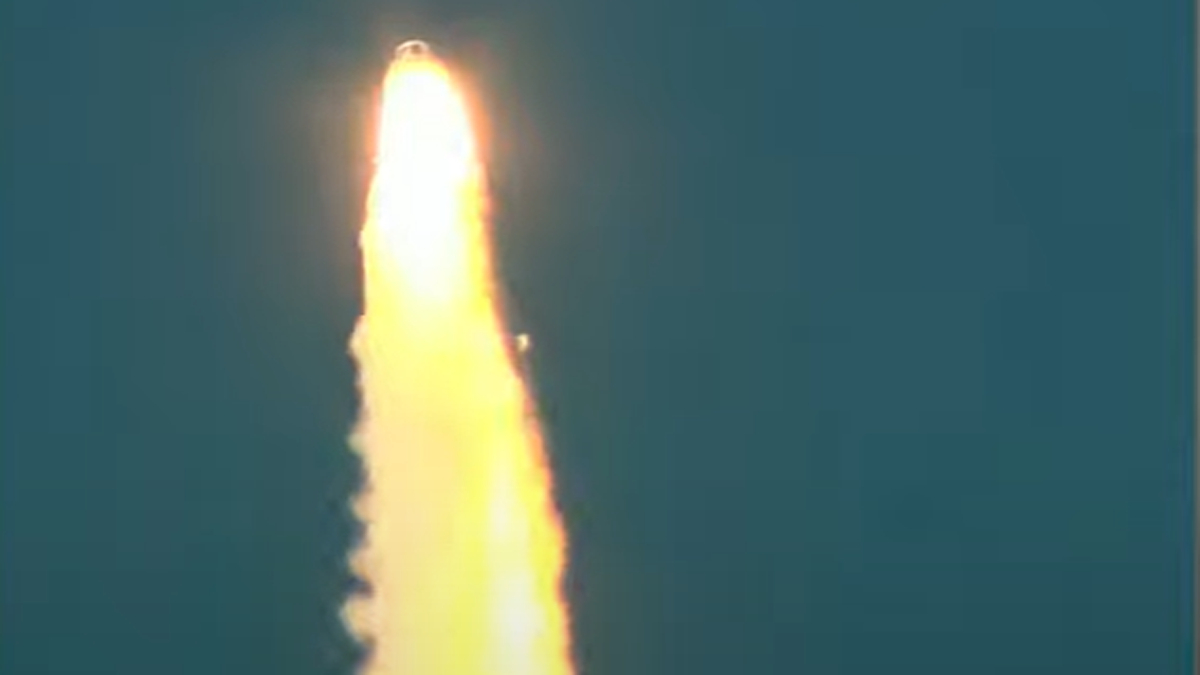Congress wants transparency on Blue Origin launch failure investigation by FAA
The House Subcommittee on Space and Aeronautics wants clear answers from the FAA on what caused Blue Origin's launch anomaly on Sept. 12.

The failure of a Blue Origin rocket during an uncrewed launch this month has members of Congress urging for more transparency of the FAA's investigation into the accident.
One of Blue Origin's New Shepard rockets was destroyed in a failed launch on Sept. 12 during while carrying an uncrewed capsule on the NS-23 science flight from the company's West Texas launch site. An abort system separated the capsule from the doomed booster as designed, allowing it to parachute back to Earth. Blue Origin has not released any details of the accident's cause nor has the Federal Aviation Administration (FAA), which is investigating the failure.
On Sept. 15, Congressional leaders of the House Science Subcommittee on Space and Aeronautics issued a letter calling for more transparency from the FAA since Blue Origin is also using its New Shepard rockets to launch passengers on suborbital trips.
Related: Failure of Blue Origin's New Shepard a reminder that spaceflight is hard
"We are relieved that no humans were onboard for the New Shepard 23 (NS-23) mission and that the abort system functioned as designed. However, just over a month ago, a New Shepard vehicle carried out Blue Origin’s sixth human commercial suborbital spaceflight in just over a year," the letter, written by subcommittee chairman Don Beyer (D-VA) and ranking member Brian Babin (R-TX), states. " On a different day with a different mission, this vehicle's anomaly could have put human lives in danger."
During the Sept. 12 launch, Blue Origin's reusable New Shepard lifted off at 10:27 a.m. EDT (1427 GMT) to carry 36 scientific payloads, including 18 funded by NASA, to suborbital space and back. But something went wrong 1 minute and 5 seconds into the flight as the rocket was nearing 30,000 feet (9,000 meters). An anomaly on the New Shepard rocket triggered its abort system, ejecting its payload capsule clear of the booster before it was destroyed.
"During today's flight, the capsule escape system successfully separated the capsule from the booster. The booster impacted the ground. There are no reported injuries; all personnel have been accounted for," Blue Origin wrote in a Twitter update after the failure. Since then, few if any details have been released.
Get the Space.com Newsletter
Breaking space news, the latest updates on rocket launches, skywatching events and more!
In their letter, Beyer and Babin said they and other subcommittee members take their oversight role on commercial spaceflight seriously.
"To that end, we request that the Associate Administrator of the FAA Office of Commercial Space Transportation keep the Members of the Subcommittee on Space and Aeronautics apprised of the plans and timetable for the NS-23 anomaly investigation, the root cause of the failure once determined, and plans to ensure that actions to address the root cause or causes are completed," they wrote. They also called for a briefing to the subcommittee within 10 days of the letter, which would be Sept. 25.
The failed NS-23 New Shepard launch was Blue Origin's 23rd mission and the second in-flight anomaly since flight began in 2015. The first anomaly occurred in 2015, when the New Shepard booster crashed instead of landing, but its uncrewed capsule successfully reached suborbital space and returned safely.
Blue Origin has not experienced any anomalies on its crewed flights. The company has launched six passenger flights since 2021, most recently on Aug. 4.
Email Tariq Malik at tmalik@space.com or follow him @tariqjmalik. Follow us @Spacedotcom, Facebook and Instagram.
Join our Space Forums to keep talking space on the latest missions, night sky and more! And if you have a news tip, correction or comment, let us know at: community@space.com.

Tariq is the Editor-in-Chief of Space.com and joined the team in 2001, first as an intern and staff writer, and later as an editor. He covers human spaceflight, exploration and space science, as well as skywatching and entertainment. He became Space.com's Managing Editor in 2009 and Editor-in-Chief in 2019. Before joining Space.com, Tariq was a staff reporter for The Los Angeles Times covering education and city beats in La Habra, Fullerton and Huntington Beach. In October 2022, Tariq received the Harry Kolcum Award for excellence in space reporting from the National Space Club Florida Committee. He is also an Eagle Scout (yes, he has the Space Exploration merit badge) and went to Space Camp four times as a kid and a fifth time as an adult. He has journalism degrees from the University of Southern California and New York University. You can find Tariq at Space.com and as the co-host to the This Week In Space podcast with space historian Rod Pyle on the TWiT network. To see his latest project, you can follow Tariq on Twitter @tariqjmalik.









